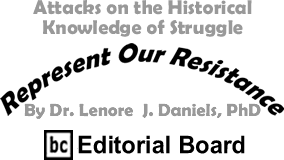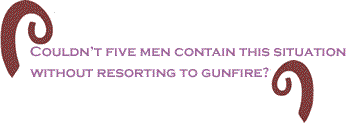
|
|||||||||||||||||||||
 |
|||||||||||||||||||||
|
||||||||||
 |
||||||||||
|
||||||||||
The current issue is always free to everyone If
you need the access available to a |
||||||||||
 |
||||||||||
When I heard that a young man, carrying a hairbrush in New York, had been shot by police, I knew it was a young Black man. It turned out to be a Black man. I am sure other Blacks in America figured this out too on immediately hearing the news. The mother calls for the police and tells them her son, behaving erratically, is nonetheless unarmed. Five policemen arrive at the scene and encounter this eighteen year-old shouting he has a gun. Khiel Coppin pulls out a hairbrush, and according to the New York Daily News, he is shot 10 times. I am sure the mother called not to have her son killed, but to be subdued. Couldn’t five men contain this situation without resorting to gunfire? Now the explanation or the narrative: New York Police Commissioner Raymond Kelly declared the shooting “fell within departmental guidelines.” Why? Young Coppin had a “history of mental illness.” He was mentally ill! I wonder if people outside of the U.S. think when this country executes and shots its mentally ill. Could there have been some way, granted more difficult and requiring concern for other human beings, to bring this young man under control besides killing him? But what am I saying? Killing is a way to remove the crisis of Black existence in America. And we shouldn’t be worried about Sen. Dianne Feinstein’s Gang Abatement and Prevention Act 2007? When a white youth gathers his parents’ guns (whites can have guns for “hunting”) and heads for his school and starts shooting “innocent” students, it is news for weeks. All involved, fellow students, teachers, principals, news media and lawyers, distance themselves from this “strange” kid with “arrogance” and an air of grand illusions or delusions. In an “innocence” narrative that represents Black youth as the menacing figure, with or without hairbrushes, cell phones, or guns, these cases of white youth violence are denoted as “isolated” and “unfathomable,” freaks of nature itself! Narratives speak of an “isolated,” dark soul.
America’s appetite for violence sailed in on the flagship RACE, or as John Henrik Clarke, noted, The Good Ship Jesus. What’s happening to Black Americans is a symptom, too, of America’s obsession with violence. America’s own “radicalization of violent ideology” (see HR: 1955) is the violent creation of narratives justifying domestic killings and the targeting of sections of Black communities. “Homeland Security” means stopping Muslims at the airport, tracking down and chasing the so-called “aliens,” Latino/as people, and incarcerating or shooting outright, Black people. Global corporatization is the militarization of the world for the benefit of U.S. interests. A surge in law enforcement in the Black community will lead (and has — remember the days following Katrina in New Orleans) to Blackwater patrols storming through neighborhoods and shooting “the usual suspects.” No Black person living in the U.S. needs to be told that No Child Left Behind (NCLB) is intended to profit King George’s brother, Neil Bush. NCLB continues where the Preamble of Hegel’s Phenomenology of the Mind left off: In the Preamble his philosophical text, Hegel declares that Africans have no history or culture and so, therefore, let’s move on to discuss the mind, history and culture of human beings. NCLB adds that Blacks have no future either. While the educational institutions effectively maintain a level of ignorance regarding historical deployment of violence in the interest of U.S. domination, the media is assigned the task of instilling fear as a preventive measure against protest, against the idea of thinking resistance.
Black Americans, for whom this knowledge of historical struggles is more real that the imagined “enemy” of the State, are, at once, the internal and external “enemy.” It is our knowledge, along with the knowledge of Native Americans and Latino/as, that is and has been historically under attack, for as we have seen, our knowledge has at times thawed the collective state of fear and forced the country into action.
Thought control works even without the presence of a police state. We can police ourselves into a state of fear if we assume that the myriad attacks on our children are too overwhelming, and we sit down and allow the media to torture us with words and images of our inferiority and powerlessness. We are engaged in a “war on terrorism” against fascists who have established sites of relational power with the intent of destroying us. (See Larry Pinkney’s Fascism: An American Reality). They will do so by any means necessary because for them, much is at stake. Destroy our spirit of resistance and the rest of the country will come quietly, like zombies, to accept authoritarian rule. We are a people of conscience, political conscience, and we can’t afford to forget the power of our knowledge of historical struggles. BlackCommentator.com Editorial Board member Lenore J. Daniels, PhD, has been a writer, for over thirty years of commentary, resistance criticism and cultural theory, and short stories with a Marxist sensibility to the impact of cultural narrative violence and its antithesis, resistance narratives. With entrenched dedication to justice and equality, she has served as a coordinator of student and community resistance projects that encourage the Black Feminist idea of an equalitarian community and facilitator of student-teacher communities behind the walls of academia for the last twenty years. Dr. Daniels holds a PhD in Modern American Literatures, with a specialty in Cultural Theory (race, gender, class narratives) from Loyola University, Chicago. Click here to contact Dr. Daniels. |
||||||||||
| November
29 , 2007 Issue 255 |
|
| Printer Friendly Version in resizeable plain text format format |
 |
 |
 |
| |
| |






















 Media
consolidation is no accident. Regardless of the arbitrary
labels of “conservative” or “liberal,” don’t expect Fox
News or Air America to connect the dots. Most
white progressives fear the thought of recognizing white supremacy
as the tradition from which springs King George’s Pax Americana
Agenda. Even if this Agenda cares no more for the white working
class and the white middle class populations, the progressives
will have to admit to the exploitation of Black people in
particular and recognize how the institutionalization of racism
protects them, while reminding Black people everyday that
they are a crucial target of the “shock and awe” assault on
civil liberties in the U.S. — otherwise known as the “war
on terrorism.”
Media
consolidation is no accident. Regardless of the arbitrary
labels of “conservative” or “liberal,” don’t expect Fox
News or Air America to connect the dots. Most
white progressives fear the thought of recognizing white supremacy
as the tradition from which springs King George’s Pax Americana
Agenda. Even if this Agenda cares no more for the white working
class and the white middle class populations, the progressives
will have to admit to the exploitation of Black people in
particular and recognize how the institutionalization of racism
protects them, while reminding Black people everyday that
they are a crucial target of the “shock and awe” assault on
civil liberties in the U.S. — otherwise known as the “war
on terrorism.”  Seventy-five
percent of the American population opposes the kingdom of
corporatization and militarization King George and Darth Vader
have established here and around the world, yet they are frozen
in the state of fear. As a result, even some of these seventy-five
percent of the American public opposed to this current administration,
still believe that, for the most part, the U.S. government
is on the side of the people. What keeps Americans in a state
of fear is its lack of knowledge. And it is not just any
knowledge or the kind offered in American educational institutions
today that urges young people of all classes and races to
climb the mountain of corporate capitalism and, in the meantime,
keep an eye on the interior and exterior monsters roaming
the streets of America and deserts of Iraq and Afghanistan.
Americans lack what French philosopher, Michel Foucault, called
the historical knowledge of struggles (
Seventy-five
percent of the American population opposes the kingdom of
corporatization and militarization King George and Darth Vader
have established here and around the world, yet they are frozen
in the state of fear. As a result, even some of these seventy-five
percent of the American public opposed to this current administration,
still believe that, for the most part, the U.S. government
is on the side of the people. What keeps Americans in a state
of fear is its lack of knowledge. And it is not just any
knowledge or the kind offered in American educational institutions
today that urges young people of all classes and races to
climb the mountain of corporate capitalism and, in the meantime,
keep an eye on the interior and exterior monsters roaming
the streets of America and deserts of Iraq and Afghanistan.
Americans lack what French philosopher, Michel Foucault, called
the historical knowledge of struggles (







